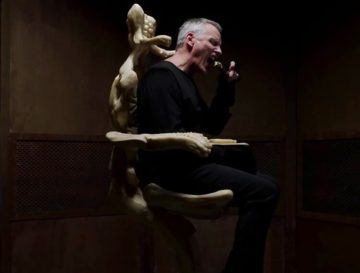David Rice in The Baffler:
 AT THE ROOT of David Cronenberg’s lifelong project is, of course, the flesh. And at the root of his engagement with the flesh is an apparent parting of the ways between evolution and reproduction. On the one hand, his most iconic characters—Seth Brundle in The Fly, Max Renn in Videodrome, the twin gynecologists in Dead Ringers, and, now, Saul Tenser in Crimes of the Future—turn away from the “normal” path of biological reproduction and toward a shadow realm where flesh and spirit combine. They are driven to explore the twisting tributaries and back alleys of the human bodily experience rather than passing their genes on to the next generation (with the possible exception of Seth Brundle). Having refused to become fathers, these men become artists, seekers compelled to abandon the human community, with its seemingly redundant circle of life, in favor of lonely but essential contact with the taboo forces that swim through our DNA just as powerfully as the urge to reproduce and care for our young.
AT THE ROOT of David Cronenberg’s lifelong project is, of course, the flesh. And at the root of his engagement with the flesh is an apparent parting of the ways between evolution and reproduction. On the one hand, his most iconic characters—Seth Brundle in The Fly, Max Renn in Videodrome, the twin gynecologists in Dead Ringers, and, now, Saul Tenser in Crimes of the Future—turn away from the “normal” path of biological reproduction and toward a shadow realm where flesh and spirit combine. They are driven to explore the twisting tributaries and back alleys of the human bodily experience rather than passing their genes on to the next generation (with the possible exception of Seth Brundle). Having refused to become fathers, these men become artists, seekers compelled to abandon the human community, with its seemingly redundant circle of life, in favor of lonely but essential contact with the taboo forces that swim through our DNA just as powerfully as the urge to reproduce and care for our young.
The grotesque ways in which these body artists (to borrow a phrase from Don DeLillo, one of Cronenberg’s literary inspirations and spirit colleagues) offer themselves up as vessels for the new flesh are immensely stylish and alluring, but, in every one of Cronenberg’s “body horror” films before Crimes of the Future, they’ve also been biologically doomed, usually culminating in early death. I think of this archetype as the “heroic pervert,” a kind of warped hero who redeems those who witness his dissolution not by conquering evil or sacrificing himself for the greater good, but by following his own compulsions beyond the furthest limits of self-regard, unraveling his organism in thrall to the unholy forces of media, madness, and disease.
More here.
